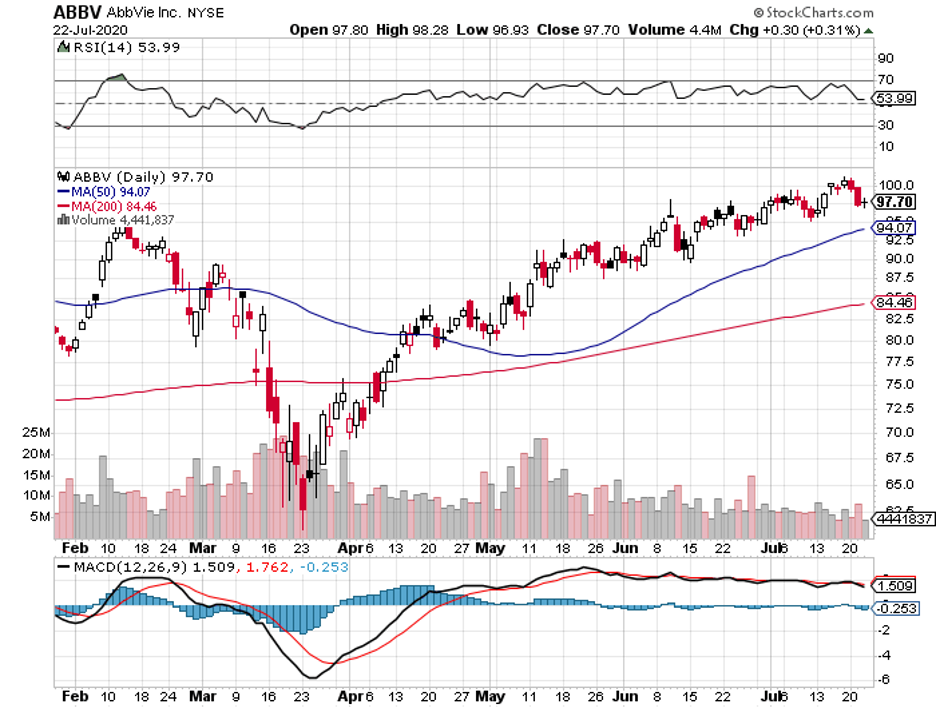AbbVie's Unexpected Upsides
After going through what could arguably be described as one of the most promising quarterly stock market performances in the past 10 years, the horrific stock market crash at the beginning of 2020 feels like a distant memory.
With the revival of the financial sector, people now will not stop complaining about exorbitant market valuations.
Despite that, not all stocks are offered at premium prices. There are several companies that remain at relatively bargain prices regardless of the encouraging market revival in the past months.
A stock that falls under this category is AbbVie (ABBV).
In the past three months, AbbVie shares jumped by over 20%. Even so, this biotechnology and healthcare stock remains unreasonably cheap, only trading at roughly 10 times its expected earnings.
Looking at the company’s profile, investors appear to shun AbbVie shares out of fear stemming from the looming US patent exclusivity loss for its highest selling rheumatoid arthritis drug Humira by 2023.
While the reality is that Humira will soon face biosimilar competition, the sales for AbbVie’s cash cow remain impressive.
In the first quarter of 2020, Humira generated $3.7 billion in revenue in the US alone, showing off a 13.7% climb year-over-year.
However, AbbVie is not twiddling its thumbs, waiting for the Humira patent exclusivity to expire in the next 3 years.
Instead, the Illinois-based company has been busy developing its next blockbuster products.
The frontrunners in AbbVie’s lineup are leukemia and lymphoma drugs Venclexta and Imbruvica.
The two generated a total of approximately $5.5 billion in annual revenues in 2019 – and 2020 is projected to record a strong double-digit growth.
In the first quarter of this year alone, Venclexta and Imbruvica raked in a total of $1.5 billion in global sales or a 32% year-over-year increase.
Still, AbbVie’s oncology franchise has yet to stop growing.
Riding the momentum of its cancer research expansion, AbbVie also recently established a partnership with Denmark’s GenMab (GMAB).
The goal is to come up with 3 anticancer antibodies, which will ultimately be able to attack cancer cells without damaging the normal and healthy ones.
If the programs succeed, AbbVie will pay $3.15 billion. This is on top of the $750 million it already offered upfront to GenMab.
However, the biggest move AbbVie made in an effort to lessen the top-line exposure to Humira is its acquisition of Allergan.
AbbVie is projected to collect over $2 billion in savings annually within 3 years since this $63 billion acquisition.
This will translate to roughly $1 per share, with 2021 earnings per share hitting $11.80 compared to $10.25 estimated in 2020.
More importantly, AbbVie gains access to Allergan’s crown jewel Botox.
While this drug is commonly known as a cosmetic procedure treatment, it can also be used to treat a wide range of medical conditions.
Just this July, Allergan received FDA approval to expand the use of Botox to cover some pediatric patients including those with cerebral palsy.
Aside from Botox, AbbVie also picked up a couple of exciting products like antipsychotic drug Vraylar.
On top of the drugs from its Allergan acquisition, AbbVie has been developing new-generation autoimmune treatments.
Two of these products, Rinvoq and Skyrizi, are expected to generate $20 billion in annual sales – a number comparable to Humira’s record.
In fact, Rinvoq is anticipated to transform into an aggressive rival of Regeneron’s (REGN) very own cash cow, atopic dermatitis drug Dupixent.
One advantage of Rinvoq over Dupixent is that AbbVie’s drug comes in the form of a pill while Regeneron’s product is an injection. This easily makes Rinvoq the more convenient option.
Even if Rinvoq fails to take away from Dupixent’s market share, the AbbVie drug can still benefit from the same group. After all, there are at least 10% to 25% of the patient pool who are unresponsive to Regeneron’s product.
That means AbbVie could earn roughly $340 million at a minimum after 2 years of its Rinvoq launch.
On the COVID-19 front, AbbVie attracted attention when its cholesterol drug Tricor was found to be effective in fighting SARS-CoV2.
There’s still no conclusive data, but the optimism was spurred when scientists at the Hebrew University in Israel and New York’s Mount Sinai Medical Center claimed that Tricor could potentially downgrade the deadly virus into “nothing worse than a common cold.”
Thanks to the promising results, the researchers will advance Tricor into animal studies.
The hope is that the drug can eventually be included in the list of treatments fast-tracked by the FDA both in the US and Israel.
Apart from that, AbbVie’s HIV treatment Kaletra has been used in China as another form of COVID-19 treatment.
Overall, AbbVie is a great pick among income-seeking investors. It offers a high yield, a promising pipeline and approved products, and a low payout ratio.
AbbVie generated $8.6 billion in revenue during the quarter that threatened to push the world into a recession, demonstrating a 10.1% increase from the same period in 2019. In terms of earnings per share, AbbVie recorded $2.02 in the said period compared to the $1.65 last year.

